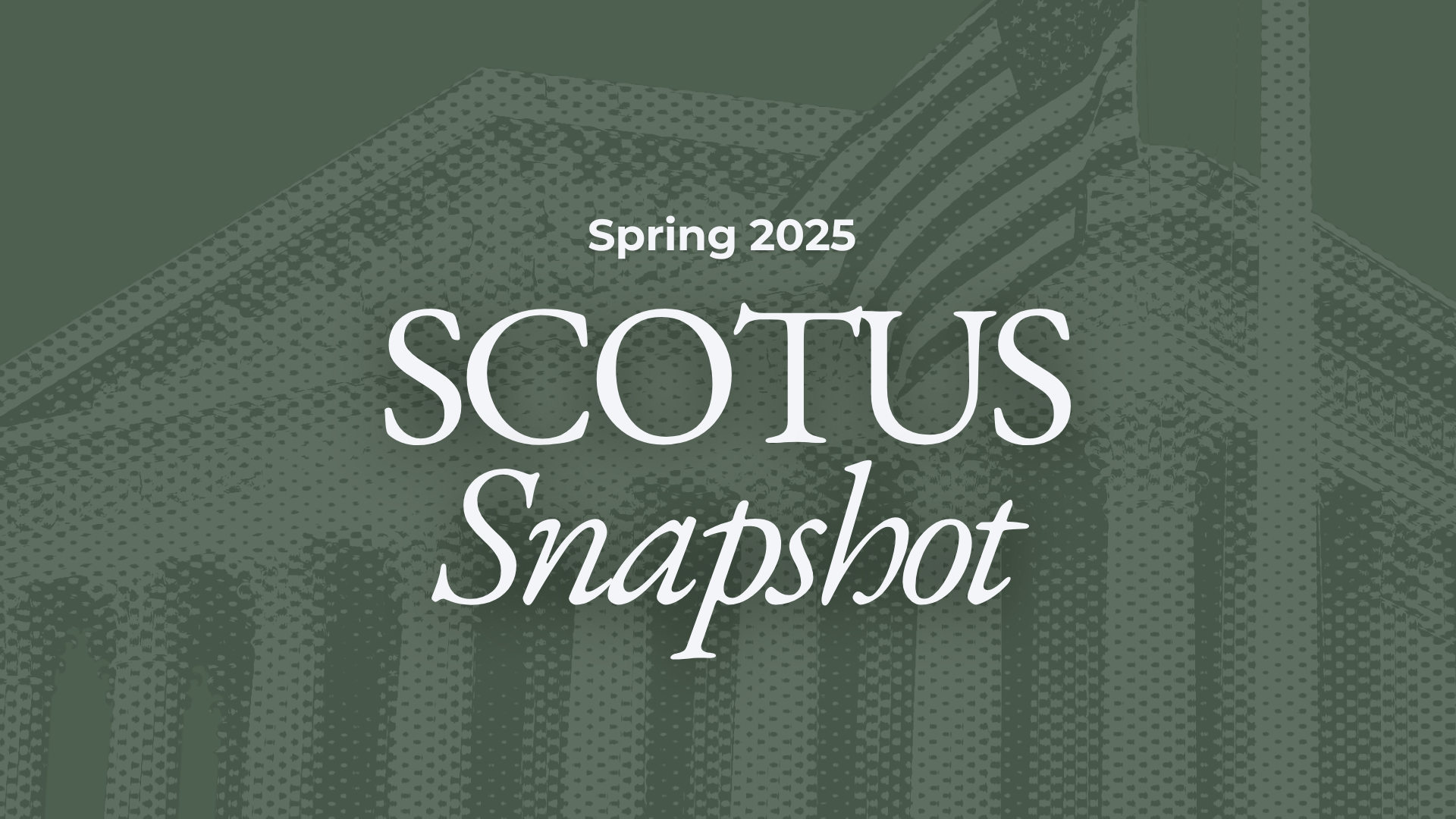SCOTUS In Review: This Supreme Court Term’s Landmark Rulings
A look back at this past Supreme Court term’s landmark cases and their impact on our legal landscape.

This judicial term, the Supreme Court issued pivotal decisions that advance the causes of life, family, and freedom. From opening the door to defunding abortion provider Planned Parenthood to protecting parental rights and shielding children from harm, these rulings reflect a return to common sense and constitutional principles. Thomas More Society closely followed these cases for their critical impact on state laws, current legal battles, and broader cultural importance.
Below are some of the term’s most significant decisions.
One Step Closer to Defunding Planned Parenthood
Medina v. Planned Parenthood (6-3)
In a 6-3 decision, the Supreme Court upheld South Carolina’s right to exclude Planned Parenthood from its Medicaid program, relieving taxpayers of the burden to fund the abortion giant and cross-sex hormone provider. While not fully defunding Planned Parenthood, this ruling empowers other states to follow South Carolina’s example, challenging the abortion industry’s financial stronghold.
Planned Parenthood said in a statement that the Court’s ruling is a “backdoor abortion ban,” and it appears that the organization is in crisis mode as it faces facility closures across the country. Supporting life-affirming pregnancy centers is now more critical than ever to counter pro-abortion legal attacks. Learn how Thomas More Society is defending these centers here.
Fight to Restore Pro-Life Speech Rights Continues
Coalition Life v. Carbondale (Certiorari Denied)
In February, the Supreme Court declined to hear Coalition Life v. Carbondale, a Thomas More Society case challenging a Carbondale, Illinois, ordinance that created a 100-foot “buffer zone” around abortion facilities, restricting pro-life sidewalk counselors from approaching within an eight-foot “bubble zone” of individuals inside that radius, without their consent.
While the Court did not review the case, Justice Clarence Thomas issued a powerful dissent, calling the decision to punt on the case an “abdication of our judicial duty” to clarify First Amendment protections. He criticized Hill v. Colorado (2000), which upheld a near-identical bubble zone law: “Hill manipulated this Court’s First Amendment jurisprudence precisely to disfavor ‘opponents of abortion’ and their ‘right to persuade women contemplating abortion that what they are doing is wrong.’”
“It was clear at the time that Hill’s reasoning ‘contradict[ed] more than a half century of well-established First Amendment principles.’ ... A number of us have since described the decision as an ‘absurd,’ ‘defunct,’ ‘erroneous,’ and ‘long-discredited’ ‘aberration’ from the rest of our First Amendment jurisprudence,” Thomas continued. “Hill has been seriously undermined, if not completely eroded, and our refusal to provide clarity is an abdication of our judicial duty…”
Thomas’s dissent highlighted the ordinance’s impact on sidewalk counselors like Sarah Richardson, who offer compassionate alternatives to women, noting that such restrictions silence speech where it is needed most. This dissent lays a critical foundation for future and pending legal challenges to similar no-speech zone laws. Thomas More Society remains committed to defending sidewalk counselors’ rights to share messages of hope and support outside abortion facilities nationwide.
Upholding Parental Rights
Mahmoud v. Taylor (6-3)
In Mahmoud v. Taylor, the Court considered whether parents could opt their children out of classroom instruction featuring LGBTQ-themed books that conflicted with their religious beliefs. The 6-3 ruling held that a Maryland school board’s policy violated parents’ constitutional right to guide their children’s religious upbringing.
Delivering the Opinion of the Court, Justice Alito wrote:
The practice of educating one’s children in one’s religious beliefs, like all religious acts and practices, receives a generous measure of protection from our Constitution… And this is not merely a right to teach religion in the confines of one’s own home. Rather, it extends to the choices that parents wish to make for their children outside the home.
This decision strengthens parents’ authority to ensure their children’s education respects their faith and allows them to raise their children in accordance with their religious beliefs.
Thomas More Society filed an amicus curiae brief in this case, emphasizing it as a straightforward opt-out issue. TMS Senior Counsel Matt Heffron noted, “This Court has consistently upheld parents’ rights to remove their children from public education conflicting with their religious convictions.” Read Heffron’s reaction to the Mahmoud decision here.

ACLU Backs Preborn Personhood?
Trump v. CASA, Inc. (6-3)
The Court’s 6-3 ruling in Trump v. CASA, Inc. restricted universal injunctions in a case about birthright citizenship. The decision prompted surprising arguments from groups often aligned with the abortion industry. CASA de Maryland’s amended class-action lawsuit claimed citizenship for “all children who have been born or will be born in the United States on or after February 19, 2025,” ironically mirroring language in Thomas More Society’s New York lawsuit against Governor Kathy Hochul, which seeks rights for the preborn and acknowledgement of their personhood.
Likewise, the ACLU’s class-action lawsuit, Barbara v. Donald J. Trump, used the term “baby” while arguing that President Trump’s Executive Order could leave children—“current and future persons”—“legally or effectively stateless.” These cases highlight a contradiction: some abortion advocates use fetal personhood language when it serves their goals, yet support abortion up to birth.
Defending Children from Harm
United States v. Skrmetti (6-3)
In a 6-3 decision, the Court upheld Tennessee’s law banning so-called gender transition and mutilation surgeries for minors, ruling it does not violate the Fourteenth Amendment’s Equal Protection Clause. Justice Clarence Thomas, in his concurrence, dismissed claims of “overwhelming evidence” supporting puberty blockers and cross-sex hormones, stating, “The American people and their representatives are entitled to disagree with those who hold themselves out as experts.”
This ruling opens the door for other states to protect children from irreversible and dangerous medical procedures, a victory for common sense. The fight against radical gender ideology continues, with Thomas More Society defending parental rights in California to ensure parents are informed of their children’s gender dysphoria and protecting teachers who refuse to hide this information. Read the latest in our case to protect parents and teachers from Parental Exclusion Policies pushed by gender ideologues across the country.
Slapping Down “Woke” Discrimination
Ames v. Ohio (9-0)
In a significant decision, the Supreme Court ruled 6-3 in Ames v. Ohio, overturning a Sixth Circuit rule that made it harder for majority-group individuals, like Marlean Ames, a heterosexual woman, to prove workplace discrimination under Title VII. Ames claimed she was denied a promotion and demoted by the Ohio Department of Youth Services because of her sexual orientation, in favor of gay candidates.
The Court rejected the Sixth Circuit’s “background circumstances” requirement, which placed a tougher burden on majority-group plaintiffs, affirming that Title VII protects everyone equally from discrimination based on race, color, religion, sex, or national origin. This ruling ensures fair treatment for all, reinforcing equal justice without extra hurdles for any single group, despite past attempts by ‘woke’ advocates and institutions.
Protecting Children from Graphic Sexual Content
Free Speech Coalition v. Paxton (6-3)
In a 6-3 decision, the Supreme Court upheld Texas’s H.B. 1181, which requires pornographic websites to verify users’ ages to protect minors from harmful sexual content. The Court, led by Justice Thomas, ruled that the law places only a minor burden on adults’ free speech rights by requiring age verification through government ID or transactional data, methods already common in other areas.
The decision affirmed Texas’s strong and compelling interest, as a protector of the common good, in shielding kids from pornography that is deemed obscene and harmful for minors.
The ruling highlights the limits of free speech rights when they come into tension with the state’s right to secure the common good and protect the safety and decency of the citizenry, especially children, against a predatory industry. This victory bolsters new and growing efforts to uphold family values and child welfare, empowering the fight against unrestricted access to explicit pornography.








